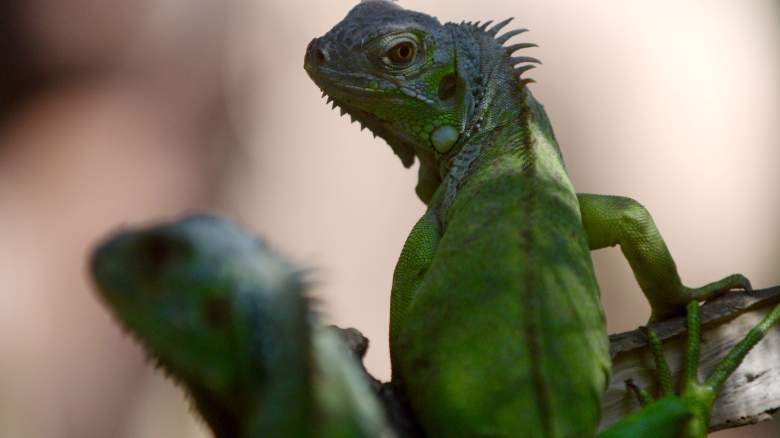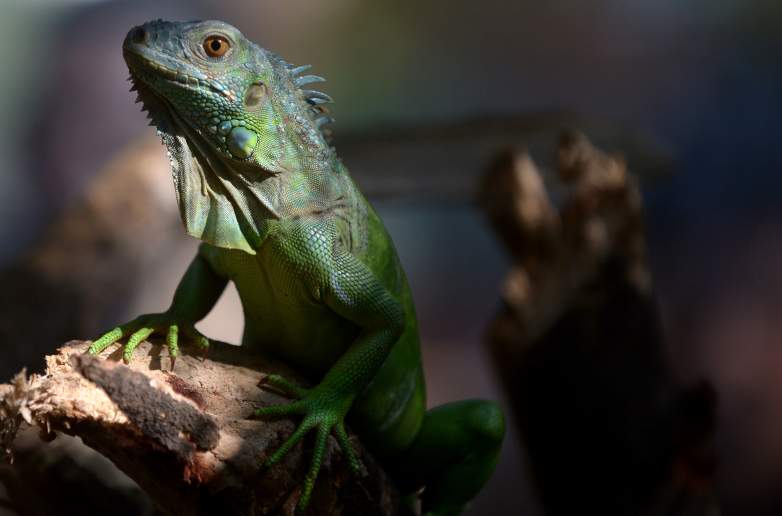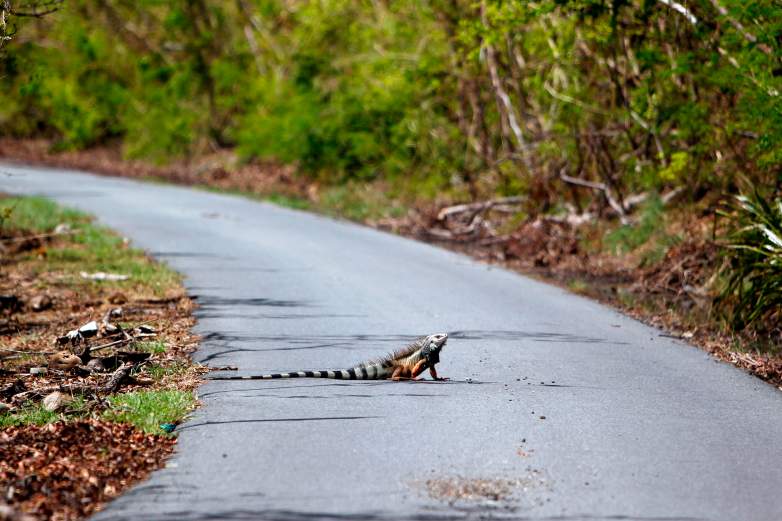
Getty A pair of Green Iguana (Iguana Iguana) also known as American Iguana.
Green iguanas are quickly making Florida their new home. The invasive reptiles are multiplying so quickly that officials are telling Florida homeowners and citizens to kill the scaly creatures.
The Florida Fish and Wildlife Conservation Commission has officially put green iguanas on their hit list, according to Fox News.
“The (commission) encourages homeowners to kill green iguanas on their own property whenever possible,” the directive says. “Iguanas can also be killed year-round and without a permit on 22 public lands in south Florida.”
Florida wasn’t the original home to these curious little creatures, but due to rising temperatures, green iguanas have become quite fond of the Sunshine State.
According to USA Today, green iguanas made their way to Florida via Central and South America, finding South Florida particularly appetizing to their climate needs. Although North Florida is currently too cold for them, man-made canals throughout South Florida have helped the green iguana population explode.
“This is a serious problem from many standpoints,” Joseph “The Croc Doc” Wasilewski, a crocodile and iguana expert at the University of Florida told ABC News. “They will destroy agriculture, undermine roads, cause electrical transformers to fail, they can transmit salmonella and can be a FAA safety hazard.”
Although Wasilewski finds the iguanas to be a serious safety concern to people throughout all of the state, he does feel bad ordering people to kill these “magnificent creatures.”
“It saddens me that all of these magnificent animals, along with multitudes of other invasive reptile species have to be put down,” he said. “There is no alternative for the problems.”
More Than 3,000 Green Iguanas Have Been Spotted in Southeast Florida

GettyA Green Iguana (Iguana Iguana) also known as an American Iguana.
In the city? In the suburbs? These green iguanas are everywhere in South Florida. At least that is what Miami-Dade Zoological Park and Gardens’ Zoologist Rob Magill told ABC News.
“Iguanas have proliferated with such intensity in Southern Florida that they are now a common sight from the suburbs into the city,” Magill said.
Iguana sights have spiked in recent years as more than 3,000 green iguanas have bee spotted in Southeast Florida alone since the Center for Invasive Species at the University of Georgia started tracking sightings in 2005, per ABC News.
The Florida Fish & Wildlife Conservation Commission says these creatures can lay up to 76 eggs per year and grow up to five feet in length.
Iguanas might not just be limited to the southeast corridor of Florida, according to Wasilewski.
“As the climate changes, even slightly, they can be established into Florida counties beyond their present distribution,” he told ABC News.
Magill thinks iguanas are here to stay so Floridians better learn how to live with them. “Unfortunately, short of removing all vegetation and any water features, iguanas are here to stay and we are going to have to learn to live with them.”
Some Are Turning Iguana Hunting into a Business Opportunity

GettyA Green Iguana is seen on a road.
As iguana populations continue to rise, so do the creative ideas on how to profit off of these species.
South Florida’s “Largest and only Iguana Control Company Dedicated” iguana hunting service is known as Iguana Control. This company specializes in removing and preventing iguanas from taking over residential and commercial areas.
Owner Tom Portuallo told ABC News, that this is the busiest iguana season he has seen in the past decade. “It’s endless what these things can do,” Portuallo said.
Other opportunities that may present itself, according to Magill, could come in the form of food.
“In Central America, iguana is considered a delicacy and there are actually farms that raise them for meat. If that sentiment could take hold here, the desire for cheap and tasty protein could play a significant role in controlling their numbers,” Magill said.
South Florida has already almost perfected the Cuban sandwich, but with a new predator and delicacy taking over the region, this metro area could be known for another type sandwich in the near future.